|
|
|
Sort Order |
|
|
|
Items / Page
|
|
|
|
|
|
|
| Srl | Item |
| 1 |
ID:
121425
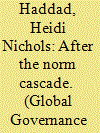

|
|
|
|
|
| Publication |
2013.
|
| Summary/Abstract |
The literature on transnational advocacy focuses on the battle for norm adoption, yet little is known about what happens to advocacy organizations after they succeed. Do they disband, take up another cause, or expand their mission? This article explores the organizational response of mission expansion through a case study of the Coalition for the International Criminal Court. The CICC-a prominent global coalition of local and international nongovernmental organizations-was instrumental in advocating for the formation and ratification of the Rome Statute, the treaty that created the International Criminal Court. Following the entry into force of the Rome Statute, the CICC did not disband or shift issues, but instead expanded its advocacy efforts and began service provision on behalf of the ICC.
|
|
|
|
|
|
|
|
|
|
|
|
|
|
|
|
| 2 |
ID:
121429


|
|
|
|
|
| Publication |
2013.
|
| Summary/Abstract |
Transboundary water politics in the Euphrates-Tigris river system have evolved with competitive power dynamics and cooperative institutional development. We analyze the evolution of transboundary water relations over four consecutive periods. The first period coincided with nation building in the region, when the riparian states focused on their domestic need for socioeconomic development rather than the formulation of external water policies. The second period saw the advent of competitive transboundary water politics shaped by the initiation of uncoordinated, largescale water development projects. The third period was the most complex, given the link between transboundary water issues and nonriparian security issues. In the fourth period, the role of water bureaucracies in the reorientation of water policies from hostile to cooperative became significant. Even in the midst of the very recent political crisis between Turkey and Syria, partial institutionalization of water cooperation and growing networks of water dialogue at both the governmental and nongovernmental levels should continue to serve as open channels for easing the tensions.
|
|
|
|
|
|
|
|
|
|
|
|
|
|
|
|
| 3 |
ID:
121428
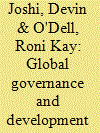

|
|
|
|
|
| Publication |
2013.
|
| Summary/Abstract |
This article compares the development ideologies of the United Nations and the World Bank by placing them on the left-right spectrum. It reviews previous ideological assessments of the two organizations and applies qualitative and quantitative content analysis of annual World Development Reports published by the World Bank and Human Development Reports issued by the United Nations Development Programme to examine their development discourse. Analysis of fifty-seven reports from 1978 to 2011 reveals two major findings. First, the World Development Reports have continuously articulated a development discourse to the right of the Human Development Reports. Second, there is clear evidence of convergence in the reports over time toward the political center.
|
|
|
|
|
|
|
|
|
|
|
|
|
|
|
|
| 4 |
ID:
121426
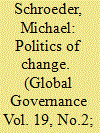

|
|
|
|
|
| Publication |
2013.
|
| Summary/Abstract |
The United Nations and many members were unenthusiastic when Nicaragua, a sovereign state, invited the UN to observe its elections in 1989. However, the UN accepted the invitation, and UN electoral services have since reached over 100 members. This article investigates UN involvement in elections from 1989 to 2006 and identifies important changes over that time in the kinds of electoral services that the UN provided. These changes cannot be explained solely by shifts in member interests, international norms, the distribution of power, or the market for electoral services. Instead, the UN made modest reforms to manage the conflicting pressures that these external shifts produced without stretching scarce resources or weakening its perceived legitimacy. However, each modest reform-an exception, symbolic institutional change, or new leadership vision-triggered additional changes by reconstituting member or bureaucratic preferences. This article specifically highlights three change processes that these reforms triggered: normalizing deviance, expanding demand, and offering political cover. These findings have important implications for scholarship on UN reform, the provision of electoral services, and the role of the UN's leadership.
|
|
|
|
|
|
|
|
|
|
|
|
|
|
|
|
| 5 |
ID:
121430


|
|
|
|
|
| Publication |
2013.
|
| Summary/Abstract |
This article describes the role of transnational policy entrepreneurs in producing and maintaining the global discourse of river basin organizations- a key element of global water governance. It takes an agency approach and draws on three streams of literature-discourse analysis, political ecology, and political economy-to derive strategies that transnational actors may use to advance discourse. To illustrate agency and strategies, it draws from a wide variety in types of RBOs across the globe. It finds that global knowledge networks exhibit the most expansive reach, serving as the oil in the machine of the global RBO discourse. This finding raises important questions around networks in the broader global water governance discourse as well as compelling questions related to governance.
|
|
|
|
|
|
|
|
|
|
|
|
|
|
|
|
| 6 |
ID:
121424
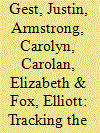

|
|
|
|
|
| Publication |
2013.
|
| Summary/Abstract |
This article provides a systematic understanding of international norm emergence and illuminates the various strategic pathways to altering global dialogue and standards of practice. It traces the steps leading to global norm emergence and identifies the range of conditions that are necessary or sufficient for potential norms to move from one step to the next. Accordingly, it analyzes the progress of six separate international norm agendas to develop a more systematic understanding of the process of global norm creation, which can be applied to fledgling efforts to establish a new regime of international migrants' rights. Based on this examination, it introduces a typology that categorizes the stages of norm development and the range of possible outcomes.
|
|
|
|
|
|
|
|
|
|
|
|
|
|
|
|
| 7 |
ID:
121423
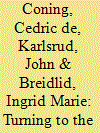

|
|
|
| 8 |
ID:
121427
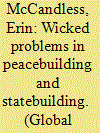

|
|
|
|
|
| Publication |
2013.
|
| Summary/Abstract |
Peacebuilding and its relatively new partner in international policy discourse and practice-statebuilding-are moving in increasingly larger circles with the recognition that business cannot be done as usual in fragile and conflict-affected states where 1.5 billion of the world's population resides. With rising prominence comes ever greater scrutiny about their nature and means for their practical realization. This article reflects on a question central to this scrutinizing that has befuddled scholars, practitioners, and policymakers alike over the past decade-how should progress out of fragility and conflict, or toward peacebuilding and statebuilding, be measured? Investigating a related question-are we making progress on this profoundly challenging task?-the article considers how international actors are endeavoring to make right on their promise to put national actors at the helm of these projects, which is increasingly assumed to be the primary driver for success in both. Examining these questions in light of scholarship, practice, and a topical policy dialogue case-the International Dialogue on Peacebuilding and Statebuilding-the article argues that, while the process and emerging outputs are messy and challenge established norms of what constitutes good assessment, they are manifesting profound changes in policy and practice, with potentially radical implications for the ways that peacebuilding and statebuilding are measured and aid decisions are undertaken.
|
|
|
|
|
|
|
|
|
|
|
|
|
|
|
|
|
|
|
|
|